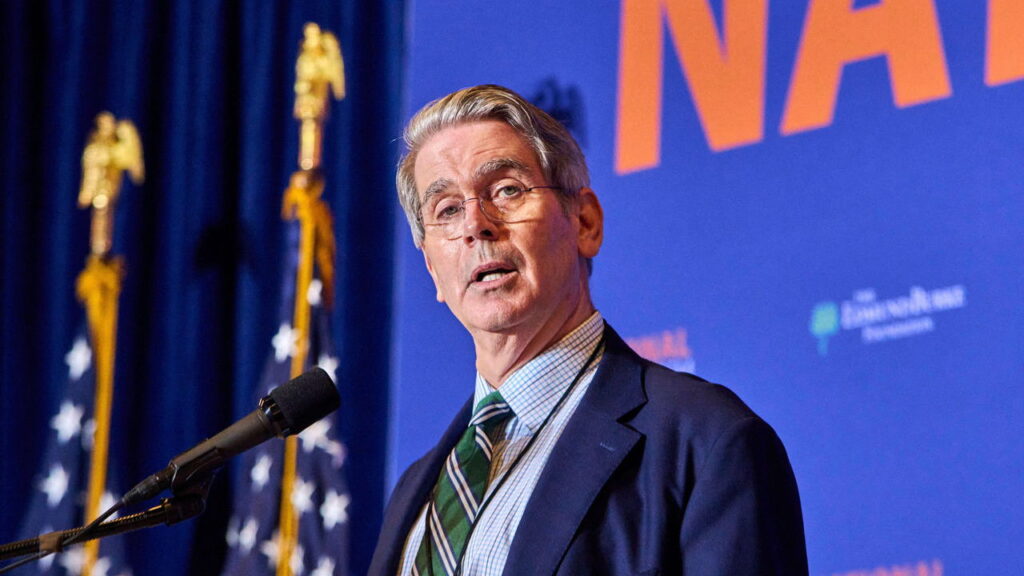At long last, a significant development has unfolded at Mar-a-Lago, the opulent residence and club owned by former President Donald Trump. After an extended period of uncertainty spanning over two and a half weeks following the recent election, and more than a week filled with speculation regarding the announcement of a treasury secretary, Trump has ultimately revealed his choice. On November 22nd, the campaign made an official statement indicating that Scott Bessent, a prominent figure within the hedge-fund industry, would take the helm at 1500 Pennsylvania Avenue, the address of the U.S. Treasury Department. This selection not only emphasizes Trump’s approach to economic governance but also sheds light on the broader fiscal strategies anticipated during a potential second term in office.
Scott Bessent, known for his success as a hedge-fund titan, brings extensive experience and a wealth of knowledge in financial matters. His appointment is indicative of Trump’s preference for individuals with a robust background in finance and investment. The inclusion of Bessent in this critical cabinet position suggests that Trump intends to adopt a business-oriented approach to economic policy, reflecting his belief in the importance of market-driven solutions and fiscal prudence. Bessent’s track record in managing large investments and navigating complex financial landscapes may prove advantageous as the administration seeks to stimulate economic growth and address national financial challenges.
Furthermore, the manner in which Bessent was chosen for this pivotal role also provides valuable insights into Trump’s management style and decision-making process. Unlike more conventional selections characterized by extensive vetting and consultation, Trump’s decision to appoint Bessent appears to have been more spontaneous and aligned with his instinctual, business-like approach. This could signify a return to the unconventional tactics that marked his first term, wherein loyalty, personal rapport, and a shared vision often trumped the typical political calculus. Such a selection process may resonate with Trump’s supporters who value a straightforward, no-nonsense approach to governance.
The choice of Bessent is also significant within the context of the economic landscape facing the nation. As the country grapples with the ramifications of recent economic challenges, including inflationary pressures and supply chain disruptions, the new treasury secretary will play an essential role in formulating and implementing policies aimed at stabilizing and invigorating the economy. Bessent’s expertise could facilitate a more aggressive strategy to tackle these issues, potentially aligning with Trump’s previously articulated goals of reducing taxes, implementing deregulations, and fostering job creation.
Moreover, this appointment reflects broader themes in Trump’s policy philosophy. By selecting someone with a proven track record in private finance, Trump seems to be signaling a clear preference for a governance style that prioritizes the interests of the business community and advocates for lighter regulatory oversight. This inclines towards a framework that promotes investment and entrepreneurship as catalysts for economic recovery and growth. The implications of this direction could be far-reaching, influencing everything from tax policy to labor laws, and shaping the overall economic climate in the United States.
In conclusion, Scott Bessent’s appointment as treasury secretary underlines a pivotal moment for Donald Trump’s potential second term, revealing key aspects of his administration’s approach to economic stewardship. This choice signals a commitment to blending financial acumen with a business-oriented philosophy, one that favors minimal government interference in economic activities. As the country braces for the unfolding of policies under Bessent’s leadership, it will be crucial for observers and stakeholders alike to monitor the effects of these decisions on both the national economy and the everyday lives of American citizens. The coming years will undoubtedly illuminate the consequences of this strategic appointment, as Trump recasts the governance of the nation through a distinctly business-savvy lens.









